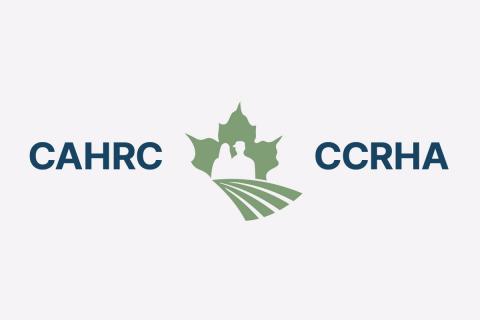Growing up in the greater Toronto area, Isabelle was a city kid who never thought she’d work in agriculture. But an opportunity presented itself in 2022. And she’s so happy she took the job.
Isabelle Weigel-Mohamed was a psychology student in the co-op program at the University of Waterloo when she applied for a job through the University’s application portal. The one-year position was with Korotu Technology, a business startup working on climate change solutions. The work involved monitoring climate change benchmarks on different agricultural practices.
Weigel-Mohamed was hired through funding from Growing Opportunities, a Canadian Agricultural Human Resource Council (CAHRC) initiative that connects employers, post-secondary institutions and students. Implemented in 2021, the goal of this program is to establish sustainable working relationships between stakeholders to be able to meet future demands for agricultural labour.
Growing Opportunities offers Work Integrated Learning (WIL) employment options for students through the Student Wage Placement Program (SWPP) that employers can access. It covers some of the costs to hire post-secondary students as part of the WIL component of some academic courses.
This led to a very exciting opportunity for Weigel-Mohamed. She explained more about her job and the duties involved:
“We were looking at best management farming practices related to climate change and the environment,” she says. “Although we recognize that a lot of farmers engage in these practices, there are others who don’t. What are the barriers to implementation? We wanted to understand their perspective more fully because they’re not a group whose voices are heard very often. How can we improve access to environmental technology and make it easier for landowners?”
She worked remotely with two other students and their supervisor in researching agriculture practices. As a team they discussed how they were going to approach this research problem phase by phase, beginning with a literature review. Then they interviewed farmers, analyzed the data, found themes and wrote an 80-page report. They were also involved with other agricultural groups in developing a webinar for farmers. This meant creating the webinar, emailing people about the event and recruiting participants.
When asked about how she contacted farmers, Weigel-Mohamed stated that they worked with a professor in environmental studies to be able to access the people they needed for their research. He recommended that they go to the farmers directly, so they went to farms, farmers’ markets and farm fairs to find their participants.
She comments, “I didn’t know a lot about agriculture before I came into this, but I always enjoyed nature and reading about it. It was really interesting to connect with farmers on the psychological aspects of their work. And it was really cool to move into a new industry.”
“What became crystal clear to me is that many farmers are seriously making changes to how they farm to become more sustainable,” she states, “and there are so many ways that they’re doing so. I also learned a lot of different environmental practices farmers are using, like conservation tillage, the use of cover crops and how reducing the use of fertilizer is helping lower greenhouse gas emissions.”
And what did Isabelle think about her experience? Here’s how she summed it up:
“Even though my goal wasn’t to work in agriculture, this work certainly shaped how I look at job opportunities. I’ve had three co-op work placements and this job was the extremely fulfilling because I was able to see a project through from beginning to end. It felt like a real accomplishment.”
She added, “I’m glad this job stuck because I really do care a lot about sustainability and the environment. It was especially interesting because the company was a start up. It was a small, close-knit, collaborative team that was exciting to be part of. I really loved the hands-on research. It was such a great change from just working on a computer or doing online studies.”
And there were more than one “ah-ha” moments for her during her interviews with farmers.
“In talking with farmers, I began to realize how difficult their jobs are and how isolated they are,” says Weigel-Mohamed. “I also recognized how hard it is to be environmentally sustainable when you’re trying to survive. There’s a lot of pressure for farmers to be at the forefront of environmental change. Farming is so challenging with all the costs involved for inputs, like fuel, seed, etc., but then they’ve got the added challenge of climate change on top of that.”
“So the question becomes: How can we develop the technology to make it easier for farmers to put best practices into place?” she concludes.
There’s no question Weigel-Mohamed enjoyed the opportunity that this SWPP funded job afforded her.
“It was nice to be able to meet farmers, and touch and smell the food – to be able to talk with the people who grew the tomatoes, as well as actively get involved in supporting local food,” she says. “After all, farmers are the backbone for food production. I gained a lot of respect for them.”
Growing Opportunities is just one way that CAHRC is helping students who have never considered employment in agriculture to learn about career possibilities.
“Food production is such a vital industry,” states Weigel-Mohamed. “To be able to make a connection with it firsthand in my area of specialization was amazing. It made me realize that there are just so many opportunities for young people who are interested in the environment and sustainable agriculture practices to have an influence.”
Interested in finding out more?
Students eligible for SWPP include those registered as a domestic student in a full or part time program at a recognized Canadian post-secondary institution. They must also take a work placement recognized by their institution as a work-integrated learning component in connection with a course, degree, certificate or diploma.
For further information on the Growing Opportunities and how you can apply, contact Megan Lockhart (mlockart@cahrc-ccrha.ca)
